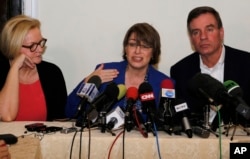A new round of negotiations aimed at normalizing diplomatic relations between the U.S. and Cuba resumes Friday, and despite serious opposition in the U.S. from some in the Republican-controlled Congress, some analysts say there may be sufficient political and economic incentives on both sides for a potential breakthrough this year.
On the table: lifting a half-century trade embargo and easing banking and travel restrictions.
“I come from a very big agricultural state," said Missouri Senator Claire McCaskill, a Democrat who was with a group of U.S. lawmakers who went to Cuba to look at trade opportunities for American companies. "We would love to sell the Cuban people more rice. We would love to sell them more chicken, and more beans and more corn, so hopefully this trip will also help my farmers at home.”
The Cuban market is small, but it's one that many American companies want access to, said Gary Hufbauer of the Peterson Institute of International Economics, a private, nonpartisan research group in Washington. He mentioned food companies such as Procter & Gamble and financial companies such as MasterCard, Visa and others, "because there’s going to be a lot of investment in Cuba if they normalize."
Given its proximity to Cuba, the state of Florida could benefit greatly from normalized relations. Jon Fay, who owns Naples Air Inc., an air charter company in Florida, hopes to add Havana one day to his list of destinations.
“It will be satisfying if we get it done," he said, noting that Cuba is "the largest island in the Caribbean. There’s 11 million people down there, beautiful beaches, weather.”
Such talk never fails to stir passions in the Cuban-American community. Remedios Diaz Oliver, president and CEO of All American Containers in Miami, said, "I wouldn’t do business with Cuba on principle, because I think it’s a country that has only demonstrated that it doesn’t have respect for human rights."
Easing the friction between the two countries could speed up the pace of reform in Cuba, said Augusto de la Torre of the International Monetary Fund.
“Reforms in Cuba are a complement to increased interactions with the U.S. in the sense that those interactions have a bigger bang for the buck, if you will, in terms of social benefits in Cuba,” he said.
And of course, there's Cuba’s most famous export: cigars. Industry experts say Cuban cigars could take over as much as a third of the premium cigar market in the U.S. if trade restrictions were lifted.
David Savona, executive editor at Cigar Aficionado magazine, said Cuba "is the birthplace of cigars. When you think about Cuba, you can’t help but think about cigars."
Negotiators believe a breakthrough in U.S.-Cuban relations is likely in the next six months, but only if Congress agrees to vote on two bipartisan bills that would lift travel restrictions and repeal the 53-year old trade embargo.













